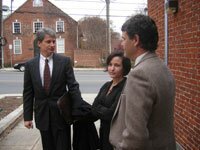NEWS- Off the hook: Reporter not called to testify in cop v. couple

Rutherford Institute staff attorney Doug McKusick, reporter Courteney Stuart, and attorney Ned Michie were ready to argue Constitutional law, and instead had an anti-climactic day in court.
PHOTO BY LISA PROVENCE
Hook reporter Courteney Stuart went into Charlottesville General District Court November 29 prepared for the worst and adamant that she would not testify despite being subpoenaed as a witness by a prosecutor. Represented by the Rutherford Institute, Stuart filed a motion to quash the subpoena and was ready to argue that it violated her First Amendment, freedom-of-the-press rights. Instead, she was excused as a witness.
"I'm pleased that the situation was taken care of in this one instance," Stuart said after her ordeal. "I hope in the future that will not happen again." That, however, is one thing the Charlottesville Commonwealth's Attorney's Office will not guarantee.
"We talked to the Commonwealth, and they made it clear if reporters gather evidence they need, they will subpoena reporters," says Ned Michie, who, along with Doug McKusick, staff attorney with the Rutherford Institute, represented Stuart. "People are going to worry the press are an arm of the police," says Michie.
Neither attorney recalls members of the media being subpoenaed locally by prosecutors, although they say it is happening across the country and is a problem of national importance.
"We wanted to get this cleared up so that in the future, the press isn't, willy-nilly, subjected to subpoenas," says McKusick, adding that such subpoena power puts a "chill" on a free, independent press. "Obviously we were hoping to win it before Judge [Robert] Downer. If we lost, Courteney was prepared to stand by her privilege, and we were prepared to appeal it on up."
Stuart had reported on the September 29 arrest of Richard Silva for public swearing/intoxication after he allegedly cursed at Charlottesville Police Officer Mike Flaherty for rushing through a Water street crosswalk. Silva's financee, Blair Austin, also was arrested for being drunk in public and for obstruction of justice. According to witnesses, Flaherty pushed her to the ground, and the couple alleged police brutality. Stuart interviewed the defendants and witnesses, and there were no confidential sources. [See related story.]
"The issue is whether the Fourth Estate can be used as an agent of the state to prove their case," says Rutherford Institute founder John Whitehead. "The press has to be in an objective position to give the news. Whether intentional or not, it's intimidating when they're called to testify with a subpoena."
Deputy Commonwealth's Attorney Claude Worrell says Stuart was excused as a witness because Silva and Austin's attorneys agreed to stipulate that her story was accurate– but he insists that in the future he will subpoena reporters if the government needs their testimony.
"We were looking for statements defendants made in [Stuart's] article that inculpate them," Worrell says.
Whitehead contends that subpoenaing reporters strikes at the First Amendment freedom of the press and has an intimidating effect on the press.
"We would disagree with that," says Worrell. "A free press, while unfettered in many respects, does not mean they can opt out of their responsibility as citizens to provide information."
Nor does Worrell see any danger of chilling the press by subpoenaing reporters. "It's theoretically possible," he says. "However, your paper's response was to have [editor] Hawes Spencer show up, you showed up, other reporters showed up. It did not chill your efforts to vigorously cover this story."
He also disputes the notion that such subpoenas make reporters an arm of the government. "No one thought the New York Times was going to be seen as a stooge of the government if Judith Miller revealed information on Scooter Libby or Valerie Plame," says Worrell.
"Subpoenas are intimidating; prosecutors are intimidating," argues Whitehead, promising, "We'll be there if they want to do it again."
#
5 comments
Any reason Ms. Stuart couldn't take the 5th? Also, what prevents her from saying "No" when asked to take her oath as a witness?
Congrats Courteney! Too bad they need to make more of this case than need be in order to wear the public down.
Cletus,
Taking the 5th means you invoke your right not to incriminate yourself by being forced to testify. Ms. Stuart would not be incriminating herself in any way. And I suspect saying "No" to taking the oath would be the same as refusing to answer questions or just not showing up to court at all; it would result in a contempt charge from the court.
The Hook needs to get over itself. Start writing about news that doesn't effect you personally. We don't care.
Ken, you misunderstand what I'm saying. Hypothetically, Ms. Staurt could have committed a crime related to the confrontation between the "officer" and the defendants. If that were the case then she would have no obligation to testify. So if she pleaded the 5th and said that if she testified she would incriminate herself the court would have to recognize her right to do that. If they wanted to offer her immunity that is another matter. However, if her testimony included any self incriminating information she has no obligation to provide that. Also, the oath not to lie that is administered in court is *contractual* in nature. You have a right not to be involved in any contract you haven't knowingly, willingly and voluntarily entered into. So when the bailiff (or whoever) asks you to swear the oath you can say "No". How then can the judge find you in contempt for not taking an oath you have no fiduciary duty to take? You can't be forced to break a law in order to comply with some other law somewhere else.